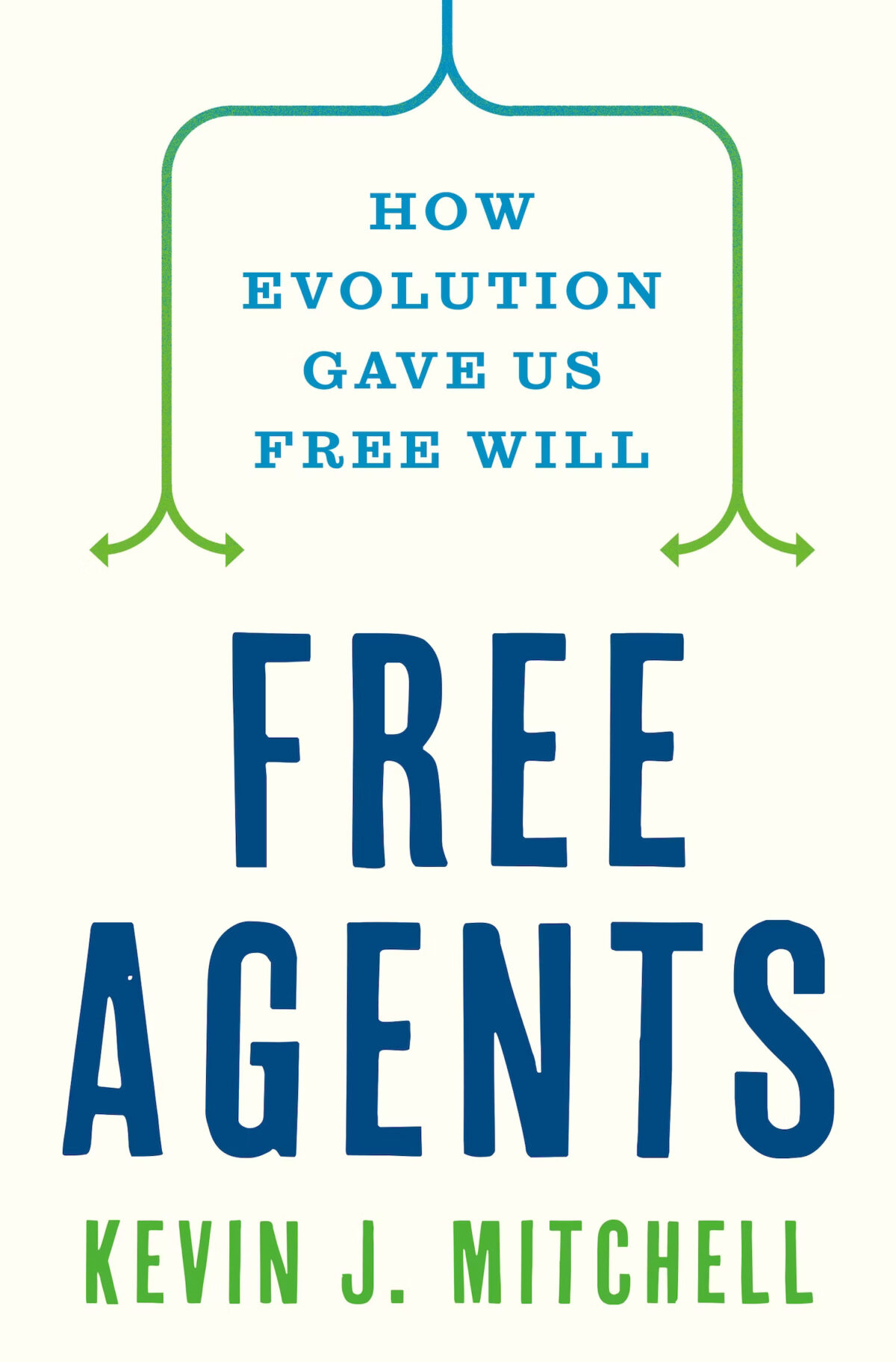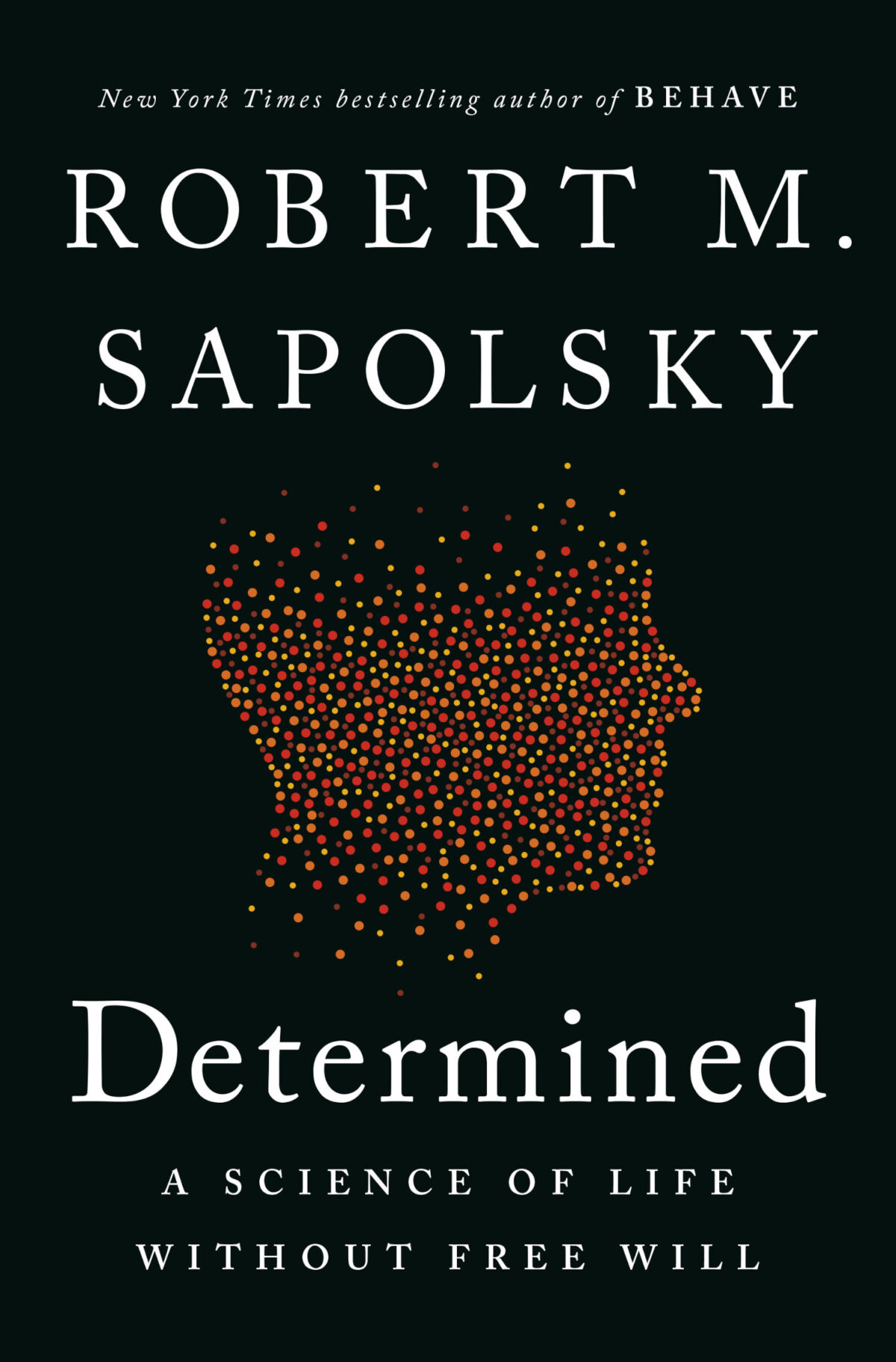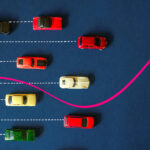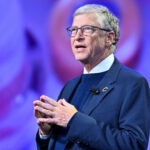It’s 1922. You’re a scientist presented with a hundred youths who, you’re told, will grow up to lead conventional adult lives — with one exception. In 40 years, one of the one hundred is going to become impulsive and criminal. You run blood tests on the subjects and discover nothing that indicates that one of them will go off the rails in four decades. And yet sure enough, 40 years later, one bad egg has started shoplifting and threatening strangers. With no physical evidence to explain his behavior, you conclude that this man has chosen to act out of his own free will.

BOOK REVIEW — “Free Agents: How Evolution Gave Us Free Will,” by Kevin J. Mitchell (Princeton University Press, 352 pages).
Now, imagine the same experiment starting in 2022. This time, you use the blood samples to sequence everyone’s genome. In one, you find a mutation that codes for something called tau protein in the brain and you realize that this individual will not become a criminal in 40 years out of choice, but rather due to dementia. It turns out he did not shoplift out of free will, but because of physical forces beyond his control.
Now, take the experiment a step further. If a man opens fire in an elementary school and kills scores of children and teachers, should he be held responsible? Should he be reviled and punished? Or should observers, even the mourning families, accept that under the right circumstances, that shooter could have been them? Does the shooter have free will while the man with dementia does not? Can you explain why?
These provocative, even disturbing questions about similar scenarios underlie two new books about whether humans have control over our personalities, opinions, actions, and fates. “Free Agents: How Evolution Gave Us Free Will,” by professor of genetics and neuroscience Kevin J. Mitchell, and “Determined: A Science of Life Without Free Will,” by biology and neurology professor Robert M. Sapolsky, both undertake the expansive task of using the tools of science to probe the question of whether we possess free will, a question with stark moral and existential implications for the way we structure human society.
Mitchell takes an evolution-based approach, arguing that living organisms, from amoebas to humans, evolved to have agency and ultimately metacognition, or the ability to understand one’s own thought process, which he believes imbued us with, at the very least, partial free will. In his longer and ultimately more convincing book, Sapolsky draws on neurobiology, social behavioral science, psychology, and more to argue, emphatically and unequivocally, that free will is an illusion; for him, “We are nothing more or less than the cumulative biological and environmental luck, over which we had no control, that has brought us to this moment.”
Before delving into the central question of whether humans have free will, it’s useful to provide some perspective on the morass of debates and terminology surrounding the topic. One essential concept to understand is determinism, which both Mitchell and Sapolsky grapple with. Basically, if the universe is comprised of the building blocks of matter, and those building blocks behave in predictable ways according to the laws of physics, then everything is predetermined, from the beginning of time until the end. Usefully, Mitchell distinguishes between physical predeterminism, which is the idea that only one possible timeline exists; casual determinism, which rests on the notion that every event is precipitated by preceding events stretching back to the beginning of time; and biological determinism, which means that an organism’s so-called choices are nothing but the result of its own physical wiring.
If you believe in predeterminism, which is basically preordination run by the laws of physics rather than by a god, then can you also believe in free will? Some thinkers, such as famed philosopher and cognitive scientist Daniel Dennett, argue for something called the compatibilist approach, which makes space for free will even as it acknowledges that we live in a physically deterministic universe. But neither Sapolsky nor Mitchell have much patience for compatibilism. For Mitchell, free will isn’t something to wedge in around physical determinism. Instead, free will is part of the physical laws of the universe. To make that argument, he delves into evolution.
If the universe is comprised of the building blocks of matter, and those building blocks behave in predictable ways according to the laws of physics, then everything is predetermined, from the beginning of time until the end.
In Mitchell’s telling, billions of years ago, single-celled organisms distinguished themselves from their non-living counterparts by starting to “do things, for reasons.” Originally, these organisms’ actions were simple. They would make decisions based on, say, whether resources were more plentiful on a certain rock. As the millennia passed, movement and sensation made life become more complicated, and organisms began engaging in a sophisticated feedback loop where they interacted with their environment and internalized the consequences of their actions over time.
In the course of this narrative, Mitchell introduces us to creatures such as the hydra, a simple freshwater polyp that does not have a brain but can still make decisions such as moving towards light, regulating whether to eat something, and leaving waters that are too hot or cold, and C. elegans, a worm higher up the evolutionary chain that exhibits the ability to learn.
Mitchell argues that as life became more complex, evolving past the worm and the polyp, creatures started exhibiting dynamism and agency, and the meaning that organisms ascribed to action, thoughts, and experiences became the most important aspect of cognition. Finally, this evolution led us to humans, who possess a complex suite of brain systems that work together to perceive and integrate our perceptions of the world around us, making decisions, integrating the decisions, thinking about our thoughts about those decisions, and even imagining the results of those decisions. This process may have evolved initially as a way for us to model our own cognitive activity, but it accidentally “freed our minds,” transforming into something that we can call free will.
The two books have a fair number of similarities, highlighting the extent to which serious discussions of free will hinge on perspective and semantics. Both authors tackle the mid-20th century revolutions concerning indeterminacy in physics and its impact on debates over free will. Both bring up Laplace’s demon, a thought experiment by the 19th-century scientist Pierre-Simon Laplace that imagines a demon that could, using the deterministic laws of physics, predict everything about the universe from its beginning to its end.
Mitchell argues that as life became more complex, evolving past the worm and the polyp, creatures started exhibiting dynamism and agency, eventually transforming into something that we can call free will.
And both authors discuss the Libet experiments, a famed set of studies from the 1980s that seemed to demonstrate that subjects’ brains showed neural activity indicative of an oncoming decision before the subject consciously knew that they were going to make that decision. Both authors dismiss Libet, with Mitchell arguing that a study conducted in a laboratory cannot be extrapolated to real-world decision-making with all its consequences, and Sapolsky arguing that it’s pointless to examine a brain’s decision-making processes in the split-second before it decides — that doing so is like trying to understand a movie by watching the last three minutes.
But despite delving into similar ideas and debates, Sapolsky reaches a diametrically opposite conclusion than Mitchell. Sapolsky, whose previous book, “Behave: The Biology of Humans at Our Best and Worst,” explored why organisms act the way that they do, doesn’t talk much about evolution in his new book. (Apart from passing mention, he covers the concept in one paragraph.) Instead, he uses a variety of other fields, from neurobiology to psychology, to conclude that we don’t have free will.

BOOK REVIEW — “Determined: A Science of Life Without Free Will” by Robert M. Sapolsky (Penguin Press, 528 pages).
He employs this generalist approach on purpose: In his view, examining the debate from only one discipline can allow claims of free will to slither in through the cracks of other, unexamined disciplines. It’s only by tackling the debate from multiple disciplines that one can systematically dismantle arguments for free will’s existence.
And over the course of the first half of his book, Sapolsky does just that. He takes us on a tour of the myriad ways in which we don’t have control over who we are or what we do. He points to the 4 million spots in a DNA sequence that code for the genes that are active in our brains — 4 million pieces of individual variability over which we have no say. He cites one study that shows that if a judge is hungry, he or she is far less likely to grant a criminal parole.
He also dives deep into the pre-frontal cortex, or PFC, the part of the brain that’s responsible for shaping what we would call grit and willpower, and argues that this region is shaped by everything from major stressors experienced by your mother while you’re in utero to the environment in which you spent your adolescence. “Whether you display admirable gumption, squander opportunity in a murk of self-indulgence, majestically stare down temptation or belly flop into it, these are all the outcome of the functioning of the PFC,” he writes.
None of these arguments are enough to disprove free will on their own, Sapolsky says, but taken together, they paint a grim picture for its existence. As he writes, “whether it’s the smell of a room, what happened to you when you were a fetus, or what was up with your ancestors in the year 1500, all are things that you couldn’t control.”
Support Undark Magazine
Undark is a non-profit, editorially independent magazine covering the complicated and often fractious intersection of science and society. If you would like to help support our journalism, please consider making a donation. All proceeds go directly to Undark’s editorial fund.
Sapolsky goes on to tackle the mid-20th century revolutions in chaos theory and quantum physics and these concepts’ impact on the free will wars. A quick primer: In the 1960s, an MIT weather scientist ran a predictor computer program with a slightly wrong number. Unexpectedly, rather than causing a slight shift in the prediction, that tiny error wreaked havoc. This accident gave rise to chaos theory, which postulates that contrary to those dry old laws of physics, some unpredictability exists in the universe. For free will proponents, these findings were a boon. If the universe behaves in an unpredictable way at times, that struck a blow against determinism, meaning that free will could, potentially, exist.
Sapolsky walks us through these arguments, as well as other pro-free will concepts, including quantum indeterminacy, which challenges the idea that the universe is deterministic, and emergent complexity, the idea that reductive, discrete parts of a system (say, neurons) can produce stunningly complex results without a master plan, which challenges the idea that you can predict what an organism will do based on examining the antics of its constituent neurons. But Sapolsky concludes that even though all these concepts challenge claims that the universe is deterministic, they do nothing for the pro-free will camp.
Back over in “Free Agents,” Mitchell does not entirely disagree. He concedes that humans do not have complete and total freedom: On the contrary, he believes that “selfhood entails constraints,” and he agrees that we are shaped by our evolution, genetics, and the random variability and environmental factors that developed our brain into its own particular organ. But, crucially, in his view, that doesn’t make us automatons. Once we evolved metacognition, we lost the ability to claim that our actions are entirely disconnected from any notion of moral responsibility. Accordingly, we should continue to praise people for their achievements and punish people for their sins, since, writes Mitchell, “Brains do not commit crimes: people do.”
These questions might seem like the stuff of dorm rooms and philosophy classes, but they have sobering consequences for the system of rewards and punishments that underlie our society.
But what is a person if not their brain? If you accept Mitchell’s assertion that free will is “the capacity for conscious, rational control of our actions,” then you must dismantle the constituent parts of that statement. What gave us the capacity for conscious, rational control of our actions? How much control does each person have? Should a person be blamed if they have lower than average self-control? Should I bear the blame if I am less rational than somebody else because of a maelstrom of factors including some distant ancestor’s mental illness? Mitchell himself even states that some people possess more free will than others. Get ready for this sentence: If people don’t have free will over how much free will they have, then do they possess free will at all?
These questions might seem like the stuff of dorm rooms and philosophy classes, but they have sobering consequences for the system of rewards and punishments that underlie our society. Sapolsky works as a consultant to public defender offices and is often tapped to explain to juries at murder trials how the brain works. This position has caused him to think long and hard about the implications of his claims. He acknowledges that he will have some detractors who fear that abandoning our collective belief in free will may cause us to “run amok.”
But he makes an impassioned case that leaving free will in the dust bin of history will actually transform us into a kinder, more forgiving society. Consider the dementia thought experiment, or the fact, Sapolsky writes, that the Victorians blamed epilepsy on people reading too many novels and not gardening enough.
As scientists demystify the brain, Sapolsky believes we can and should stop blaming any individual for any behavior, even if he sometimes feels “crazy, embarrassed” about making such extreme arguments. He imagines a radical world where, instead of blaming and punishing criminals, we retool our criminal justice system to simply quarantine dangerous individuals, the way we would for people who are sick with, say, Covid-19.
“We can subtract responsibility out of our view of aspects of behavior. And this makes the world a better place.”
At a college graduation, we should congratulate the valedictorian and the custodian equally, since neither earned their place on the stage or in the utility closet. We should acknowledge that all our supposed flaws, from obesity to alcoholism, are not our fault, thus freeing ourselves from the “pain and self-loathing, staining all of life, about traits that are manifestations of biology.”
Sapolsky’s book is far from perfect: A vigorous editor certainly could have trimmed it down, and the author frequently wanders off on tangents about factoids that, while admittedly fascinating, can detract from his main narrative. But his argument — that free will does not exist — is ultimately more persuasive than Mitchell’s, which concludes that we do possess free will.
Read Mitchell’s book for an intriguing scientific journey on how we evolved movement, agency, imagination, cognition, and personality — all those essential aspects of being human. Read Sapolsky’s book if you want to shatter that quiet, persistent belief that you exist somehow separately from your biology — and, after you’ve recovered from the existential blow, imagine the potentially radical implications. “We can subtract responsibility out of our view of aspects of behavior,” Sapolsky writes. “And this makes the world a better place.”
Emily Cataneo is a writer and journalist from New England whose work has appeared in Slate, NPR, the Baffler, and Atlas Obscura, among other publications.











Comments are automatically closed one year after article publication. Archived comments are below.
There is no doubt our behavior is influenced by factors outside our control. People who are abused are more likely to abuse others. Anyone with children knows that differences in temperament are there from the beginning. And we take those factors into account. We might take someone’s difficult life into consideration when deciding the severity of their punishment. But the broader question of free will vs. determinism as discussed in this article is unresolvable and has no real consequences in our personal and social lives. That’s because it’s a matter of philosophy – metaphysics and morality – and not one of science.
Science, and philosophy for that matter, will never solve this problem because there really isn’t any problem there to be solved.
This is a really great review of books on a challenging area. I’ve bought Sapolsky’s book and have renewed determination to put in proper effort to read it!
Two very challenging books very well analyzed, explained, and compared. Brava!